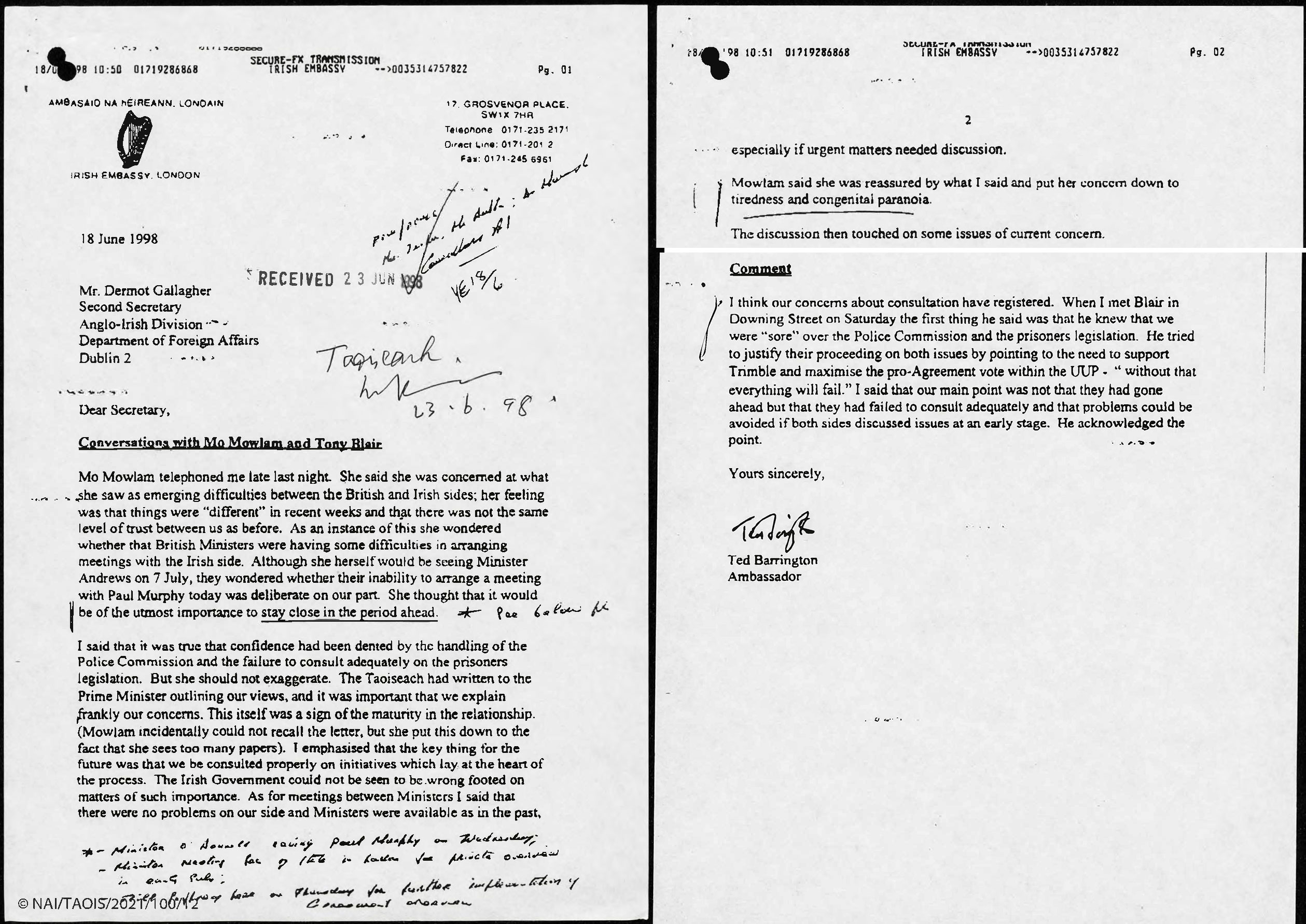
Extracts from a letter from the Irish Ambassador in London to Dermot Gallagher, a senior official in the Department of Foreign Affairs in Ireland June 1998
Context notes
The author of this letter was Ted Barrington, Ireland’s Ambassador to the UK. He was reporting back to his superiors in the Foreign Affairs Department of the Irish Government about a phone conversation with Mo Mowlam. Mowlam was the UK Government’s Secretary of State for Northern Ireland. Paul Murphy MP was a UK Government Minister, a senior UK official, who worked in Mo Mowlam’s department as Political Development Minister of State for Northern Ireland. A major part of Murphy’s job was liaising with officials from Ireland.
Transcript
AMBASAID NA hEIREANN. LONDAIN
IRISH EMBASSY, LONDON
17 Grosvenor Place
SW1X 7HR
18 June 1998
Mr. Dermot Gallagher
Second Secretary
Anglo-Irish Division
Department of Foreign Affairs
Dublin 2
Dear Secretary,
Conversations with Mo Mowlam and Tony Blair
Mo Mowlam telephoned me late last night. She said she was concerned at what she saw as emerging difficulties between the British and Irish sides; her feeling was that things were “different” in recent weeks and that there was not the same level of trust between us as before. As an instance of this she wondered whether that British Ministers were having some difficulties in arranging meetings with the Irish side. Although she herself would be seeing Minister Andrews on 7 July, they wondered whether their inability to arrange a meeting with Paul Murphy today was deliberate on our part. She thought that it would be of the utmost importance to stay close in the period ahead.
I said that it was true that confidence had been dented by the handling of the Police Commission and the failure to consult adequately on the prisoners legislation. But she should not exaggerate. The Taoiseach had written to the Prime Minister outlining our views, and it was important that we explain frankly our concerns. This itself was a sign of the maturity in the relationship. (Mowlam incidentally could not recall the letter, but she put this down to the fact that she sees too many papers). I emphasised that the key thing for the future was that we be consulted properly on initiatives which lay at the heart of the process. The Irish Government could not be seen to be wrong footed on matters of such importance. As for meetings between Ministers I said that there were no problems on our side and Ministers were available as in the past,
2
especially if urgent matters needed discussion.
Mowlam said she was reassured by what I said and put her concern down to tiredness and congenital paranoia.
The discussion then touched on some issues of current concern.
3
Comment
l think our concerns about consultation have registered. When I met Blair in Downing Street on Saturday the first thing he said was that he knew that we were “sore” over the Police Commission and the prisoners legislation. He tried to justify their proceeding on both issues by pointing to the need to support Trimble and maximise the pro-Agreement vote within the UUP – “without that everything will fail.” I said that our main point was not that they had gone ahead but that they had failed to consult adequately and that problems could be avoided if both sides discussed issues at an early stage. He acknowledged the point.
Yours sincerely,
Ted Barrington Ambassador
Questions
Content
- According to Barrington what concerns does Mo Mowlam have?
- What issues had “dented” relations between the UK and Ireland?
- What was the underlying concern that Barrington said that the Irish Government had about how the UK had acted?
Inferences from the Content
- Would historians be able to infer that on the whole Barrington was optimistic about relations between the UK and Irish governments?
Inferences from the Context
- Can a historian make any inferences from this document about how well the UK and Irish governments were communicating or co-operating?
Lines of Argument
Which line(s) of argument A-E could use this document as supporting evidence?
